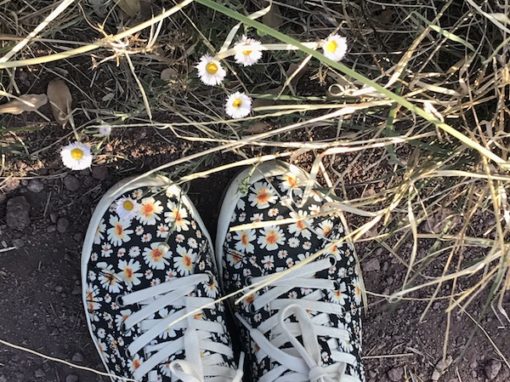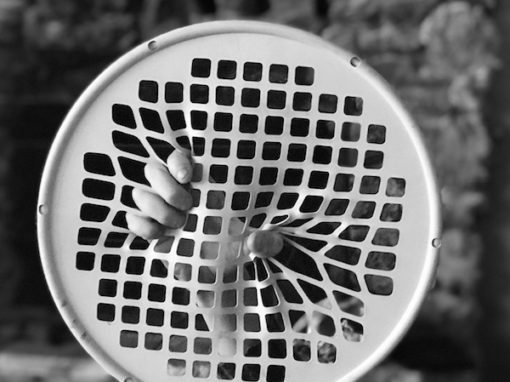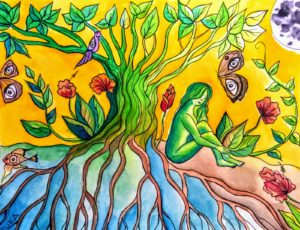Today, I’m getting real about what depression has felt like when it decides to lodge itself into some of the corners of my soul. After talking to a friend today and with many others who have learned to identify and sit with the weight that is depression, I feel inclined to talk about some of my own experiences with depression and mania, with sorrow and joy, and how I am learning to hold them at the same time. The last two years have given me breathing room to begin to learn about some of my emotions- to identify my needs and wants, as well as what I don’t want. This process is hard. Last spring, I was labeled with having Bipolar Type 2 disorder, and though I don’t talk about it very often, I think the classification provides context to why I try to cultivate a mentality of joy, play, and wonder in the ways that I do. My joy comes out of my sorrow; my light comes with my darkness; and yet, I don’t see these as binaries, but as blended.
Word for the Wise (You!)
As a caveat, I want to say that I am only writing from my own experiences, and they are not clinical explanations, or truth, beyond what I have seen in my own mind, body, and heart. I think this is important to say because I believe there is no singular truth and no singular experience with depression, anxiety, mania, or other mental illnesses. I also am not sharing everything, because there are many things I continue to work on for myself, with myself and a therapist and friends, and that is its own journey–one that doesn’t have to be public for me to know it is real. But a particular aspect of how I’ve felt when I’m depressed is something I do feel called to write about today, and that is the notion of being stuck in whatever I perceive as my present reality.
What if This Never Ends…
One of the ways depressive thinking manifests for me is a sense of stuckness. This feeling is visceral, rational and emotional; it seems to take over my past, present, and future. I’ll share what it can sound like for me, from a space of vulnerability. This dialogue is not my inner voice (jackal) all the time, but when I am in a place of more darkness and self doubt, a variation of this narrative often frequents my mind:
I’m in a state of transition right now, sure, but what if this lasts forever? I haven’t “figured out” my career path yet, and I haven’t figured out where I want to be, or how I want to contribute through my work. I got back to Tucson and am back at my parent’s home, and sure, while I’m reconnecting with them and enjoy doing that– though being with family and learning to be real with one another is HARD- what the f#@* am I doing with my life? What if I never figure “it” out? What if there’s never any clarity? What if I hop from place to place, job to job, skating across the surface, never going deep, for all of these next 2, 5, 10 years? And then I’ll have wasted my thirties and all for what?”
Stepping back, after taking a breath, what do I notice from this narrative? Three things stand out: I, should, and “What if.” When I am in these places where depression seems to grow stronger in its roots, there is a lot of self-deprecation, as well as self-focus, based on the intangible future. So much of my thinking is selfish, even though it’s trying to think about other people. But that generosity, or thinking of other, is really just a strategy, not the reality. I use the word should, always an indicator and invitation to pay better attention to where that should comes from. I’m in a space of future possibilities but not paying any attention to my present, not really celebrating where I am, what I have. When these things: the I, the should, and the what if come together, for me I enter a place where I’m scared, fearful, and doubting of myself, and I think it will last forever. That is the power of depression.
Depression can smother hope. It can make the temporal feel permanent, and those feelings of not-enoughness, of fear, of loneliness seem like they might never go away. I experienced this most viscerally last spring. I was in one of the more depressed places of my life. I had just returned to Tucson after leading a semester program through four countries. For those four months, I had focused so much on others– my students, coworkers, boss, the countries we were learning about, the systems of inequality that exist in the health care world, and in doing so, I had forgotten how to caretake myself. In fact, I had started binding my self care to others’ state of wellbeing, believing that I could celebrate when we, as a group, were in flow; therefore, when we weren’t jiving, I blamed myself, took it all as my responsibility, and wallowed in that space.
I got back to Tucson and was not only dealing with culture shock, but also with this realization of how much of my life I have focused on other: family, partners, students, friends. This act, of living a life for the loved ones around you, is something I do deeply value, and yet, there is a vital difference between living a life in relation to others and living a life for oneself as well as for others.
I didn’t know if I existed without others to affirm my existence. I didn’t know I was beautiful without someone to say it. I didn’t know I was a teacher without people to teach. I didn’t know I was enough without someone to tell me I was. How could I take up space when I didn’t even know the contours of myself?
As a woman raised in the era of the 1990s heteronormative princess phenomena, a time reminiscent of the 1950s in some way with messages implicit and explicit from media and society about my role being dependent on someone else, it has been hard to unlearn this tendency to live in relation to Other. I focus on other people so that I don’t have to sit with my own empty spaces.
Sitting with Emptiness Last Spring
For an (introverted?) extrovert like me who loves experiences– a 7 in the Enneagrams– my go-to is to go. I tend to go to the next country, the next new romance, the next activity (painting, guitar, hiking, biking, climbing, etc.) rather than stay with the empty spaces inside of me and learn how to love them. Last spring, exactly a year ago, I finally had to stop. I practiced letting myself grieve from a multi-year relationship I had ended the year before but had never really mourned. I realized how much of my own sense of self-worth I put in my students, in trying to help and being of value to them. I saw how much of my sense of self came from doing things that were seen as “cool, adventurous, awesome, fun, amazing,” and how I wasn’t as comfortable sitting with myself in the everyday. The everyday had somehow, in my mind, not become enough, even though it really is all that we have. I sat with these things, and not often in a pretty way. There were tears, dating new people I wasn’t sure about, a few nights of me and a wine bottle, lots of emotionalizing, and endless questions of “What’s next?”
And, there were moments of relief. I spent a lot of time doing physical exercise, biking and running, hiking and getting outside. I learned how to be with humans here in the States again. I made friends! With my family, I began to articulate my need for boundaries, for honoring my independence but still being with one another, even and especially with our differences. I got in a few heated discussions with my dad as I practiced voicing what I believe, even though one conversation ended at a local restaurant, after a bottle of wine, with sobbing and anger as I demanded gender be seen as fluid and non-binary. And, yet, the next day, we talked about it with clear heads. So much learning. I hosted a full moon party where we burned things in a fire and sang songs to one another. I climbed a rock wall outside. There were hours I spent hugging our family dog and just crying into her fur. This, for me, is what healing looks like.
Some Celebrations of New Growth
For me, the depressive side of bipolar doesn’t just leave. It is something I become aware of when I wake up without enough sleep, in a mood, when everything feels wrong. It’s there when I’m feeling lonely, unloved, unsure, and overwhelmed with learning about the injustices of the world and thinking I have to solve everything. It seems, in writing this, the depression truly walks hand in hand with narcissism, a sense of needing to control life in order to live it. There is saviorism here, as well, a belief that if I can save others, I can save myself.
A year later, I can now better hear the voice as one who is outside of it. I can almost see it coming, this mesh of a condescending grandmother and a rogue cowboy, pushing all the buttons of my self worth. And I know that for me, getting outside and moving helps. A morning routine helps, as does a mourning routine, I suppose. Eating less sugar and not drinking caffeine helps. Also, that bottle of wine doesn’t ever help. Not even one glass. So how do I caretake this creation that is me? This divinity incarnate in some sort of walking, dancing, breathing form? How do I honor the parts of me I love– my ideation and need for joy and play, my childlike wonder and positivity, my belief in radical compassion and creative impulse? I honor them by expanding. Part of my balancing act is learning to hold both parts: the joy and the sadness, the healing and the wounding, for they go hand in hand and walk side by side.
A Lesson on Joy from Poet Ross Gay
Last January, at the Tucson Book Festival, I went to a talk on Joy and Positivity where Ross Gay, poet and professor, shared his experiences writing “Book of Delights” and other works. He is a tall, black man who was wearing a pink shirt, and his smile is the widest I have ever seen. Instantly, I felt like I wanted to sit in a garden and talk about life philosophy with him for hours. I also realized, looking around the room, that he was perhaps the only person of color in that auditorium. After spending that whole semester with a group of students who were diverse in race, ethnicity, religion, and their socioeconomic upbringings, I was so attuned to my lens of whiteness, my own bubble and its limitations, and that was all I could see.

Depression has helped me to see the world differently. In my place of not needing to be joyful, bubbly, smiling all the time, I better saw the systems of this world– the patriarchy, the capitalism, the white supremacy, the ableism, the ageism that define so many moments, and I didn’t need to fix, or solve, or do anything. I could mourn, and be sad, and see things for what they are. Depression was also teaching me, helping me understand sorrow.
During the talk, one of the authors, a white male, shared with us a romanticized tale of poverty in the form of a “poor but happy” fisherman he’d seen while attending some event at a fancy house in Florida. The fisherman had been there along the water, casting his line, hoping for a fish, wearing old, worn looking clothes. The author shared how that moment shifted his worldview. The fisherman with so little, but, assumedly with so much. It was big for the author, and I’m glad he had it a shift in perspective, and yet, I was also so darn tired of the narrative of white folks (and other folks of higher socioeconomic classes) finding simplicity, beauty, joy in someone else’s suffering– that he, and I, have the privilege of looking at that simplicity as freedom and joy because we don’t have to live through the sorrowful parts. It felt like this story encompassed all of the suffering I was seeing on a systemic level.
There was Q&A at the end, and my heart started to race, so I knew I had to raise my hand even though I had no idea what I would ask. Ross made sure I got the mic. I asked,
How we can talk about joy and positivity when there is so much suffering in this world, in this country? Is it trivial to talk about such an emotion when so much pain, inequality, poverty, and hurt affect people daily? How do we talk about joy without acknowledging suffering? What is the point? I started crying as I asked it.
Ross nodded, more than the others, more than the white author who looked baffled and shook his head in confusion at the question. Ross answered first and his answer is the only one I remember. You know, he said, sorrow and joy, they’re like family. There can be no joy without suffering. And suffering is an important part of who we are. We can’t just stay in the joy space and not see the suffering side, the sorrow. The message he left me with is that the sorrow of the world is real. To ignore it, systemically, externally, internally, is wrong. But to see the suffering, and to see what joys there also are– a kid flying down a hill on his bike, a new plant growing in the garden– that is its own form of healing.
Joy and Sorrow: Siblings in Life
I think about that festival a lot, almost a year ago, and how I believe we, as humans, have to stretch and expand to hold sorrow and joy, inequality and justice, anger and redemption, forgiveness and acceptance, all at the same time. In Buddhism, they talk a lot about “forgive the person, but don’t condone the action.” What does it mean to actually extend compassion to someone who hurts you but not to accept the action? Joy in the forgiveness, perhaps, and sorrow in the brokenness.
My hope for myself, as I move forward in this world for however long I get to explore it, is that I can continue to see judgment and depressive tendencies when they emerge– that I can see that voice of sorrow, sorrow for myself or another, and accept it without identifying with it, and also ask what it can teach me. I hope to see my need to look for and create joy and play with acceptance and compassion, rather than seeing these emotions as superficial or Band-aids. I hope to expand to hold all of these beliefs in a non mutually-exclusive way. They are non-binaries; they are sisters; they are scaffolding; they are partners. The Joy and the Sorrow, the Suffering and the Celebrating. We are witness bearers to them all.




